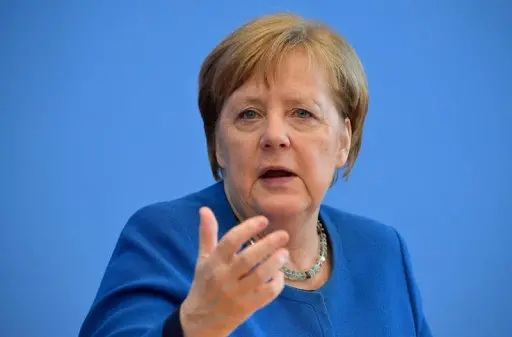German Chancellor Angela Merkel wants further restrictions on public and private gatherings as the spread of the coronavirus is easing too slowly despite a partial lockdown since early November.
People from one household should only meet publicly with a maximum of two people from another home, according to a draft paper quoted by several German media outlets and cited Monday by Bavaria Premier Markus Soeder. This is down from a previous limit of 10 people from two households.
The paper -- prepared for Merkel’s talks with Soeder and the 15 other regional premiers later Monday -- also suggests making face masks mandatory in all schools and for all age groups and urges citizens to avoid private parties until Christmas.
After declining significantly through July, the number of cases began ticking up again across Europe in early August, spread by travelers returning from vacation and failure to observe distancing and hygiene rules. Germany has far fewer cases and deaths than nations like the U.K., France and Italy, but the government has warned that rapidly-filling hospitals are threatening to stretch the health system to its limit.
Merkel last week opened the door to extending existing virus restrictions into December, but a decision on this is not expected on Monday. Over the weekend, she again warned the nation about difficult winter months ahead, and her economy minister, Peter Altmaier, predicted that Germany will have to live with “considerable restrictions” for at least the next four to five months.
Soeder said the monthlong, partial lockdown introduced Nov. 2 -- designed to limit social contact by closing bars and restaurants, while keeping most businesses operating -- is showing “first signs of success.” However, he said the spread of the disease at schools needs to be addressed and it’s vital to further reduce social contact.
“It makes sense to keep going until we see a real effect and implement the measures that are successful,” Soeder said Monday in an interview with ZDF television. If the restrictions are extended into December, more financial aid will have to be provided to sectors affected by the measures, he said.
For the time being, Germany’s strategy to contain the virus is less severe than in countries like Austria, where the government will shut schools, most stores, and services such as hairdressers starting Tuesday.
While the rapid increase in new cases in Germany has slowed slightly, levels are still too high, Merkel said last week. In the past seven days, daily infections have risen at 17,189 on average, according to data from Johns Hopkins University. This is down from 18,652 during the previous seven days.
Merkel has repeatedly urged Germans to abide by hygiene and distancing rules so that health-care services don’t collapse, calling the crisis the biggest test since World War II.
The number of patients being treated for the virus in intensive care facilities is at a record 3,394, according to the DIVI register of German ICU capacity. At the beginning of October, there were less than 400 Covid-19 cases in German ICUs.
(BLOOMBERG)
 简体中文
简体中文












